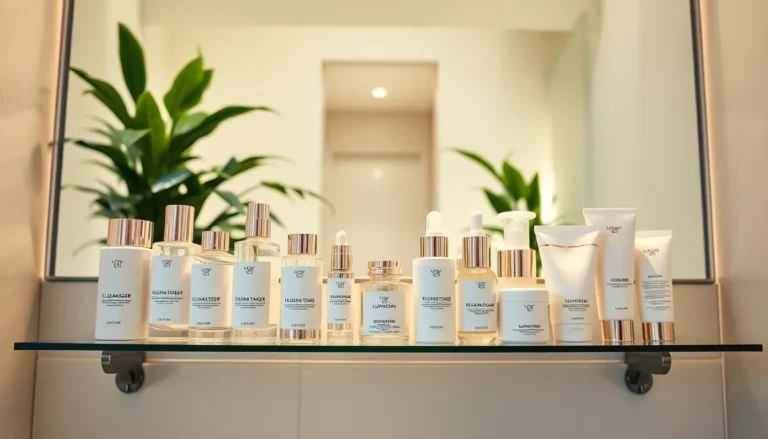Table of Contents
ToggleDealing with oily skin can feel like an endless battle. One moment you’re feeling fresh and fabulous, and the next, you’re sporting a shiny forehead that could double as a disco ball. It’s a common struggle, but fear not—there’s hope! With the right skincare routine, oily skin can become a thing of the past, leaving behind a radiant and matte complexion that’ll have everyone asking for your secret.
Understanding Oily Skin
Oily skin results from excess sebum production, leading to a shiny appearance. Comprehending this skin type is essential for effective skincare.
Causes of Oily Skin
Hormones significantly influence sebum production. During puberty, increased androgen levels trigger oil gland activity. Genetics also play a role, as individuals often inherit oily skin traits from parents. Environmental factors contribute, including humidity and temperature, which can boost oiliness. Stress causes the adrenal glands to release cortisol, stimulating oil production. Poor dietary choices, such as high sugar and dairy intake, may worsen oily skin. Certain skincare products clog pores, leading to more oil accumulation.
Impact on Skincare
Oily skin changes how products interact with the skin. Using heavy creams can exacerbate shine and lead to breakouts. Lightweight, oil-free moisturizers are crucial for hydration without added oil. Cleanser choice matters, as harsh cleansers may strip skin of natural oils, provoking more sebum production. Exfoliation helps prevent clogged pores by removing dead skin cells. Regular use of clay masks can absorb excess oil and refine skin texture. A consistent routine tailored to oily skin prevents issues and supports a balanced complexion.
Essential Components of Skincare Routines for Oily Skin


A well-rounded skincare routine addresses the specific needs of oily skin. Key components include effective cleansers, targeted exfoliators, and suitable moisturizers.
Cleansers
Gentle foaming cleansers or gel formulas reduce excess oil without stripping natural moisture. Look for products containing salicylic acid or tea tree oil, as these ingredients help control breakouts. Cleansing twice daily removes dirt and impurities that could clog pores. Opt for non-comedogenic options to avoid exacerbating oiliness. Regular cleansing establishes a clean canvas for subsequent skincare steps.
Exfoliators
Exfoliation enhances skin texture and unclogs pores by removing dead skin cells. Chemical exfoliants, like alpha-hydroxy acids or beta-hydroxy acids, work effectively for oily skin types. Use exfoliators 1-3 times a week to prevent over-exfoliation and irritation. Incorporating clay-based masks also absorbs excess oil while providing gentle exfoliation. Product selection should focus on formulations that target oil control without causing dryness.
Moisturizers
Choosing the right moisturizer is crucial for oily skin. Lightweight, oil-free, or gel-based moisturizers hydrate without adding excess oil. Look for ingredients such as hyaluronic acid or glycerin that provide hydration without clogging pores. Moisturizing creates a balanced environment, even for oily skin. Daily application of a suitable moisturizer helps maintain skin elasticity and prevents overproduction of oil due to dehydration.
Recommended Products
Selecting the right products can greatly improve the management of oily skin. The following categories include top recommendations to help achieve a balanced complexion.
Top Cleansers for Oily Skin
Gentle foaming cleansers effectively remove excess oil without causing dryness. Popular options include those with salicylic acid, known for its ability to penetrate pores and target breakouts. Tea tree oil cleansers also offer antibacterial benefits, minimizing oil while soothing the skin. Gel-based formulations maintain hydration and clarity without heaviness, providing a fresh cleanse every time.
Best Exfoliators to Consider
Chemical exfoliants, such as glycolic acid or beta hydroxy acid, effectively unclog pores and slough away dead skin cells. Products with a concentration of 5-10% are ideal for oily skin, promoting a smoother texture. Using these exfoliants 1-3 times a week can prevent breakouts. Brands that incorporate natural ingredients like willow bark enhance exfoliation while calming irritation.
Lightweight Moisturizers
Oil-free moisturizers are essential for maintaining hydration without contributing to excess shine. Look for gel-based options containing hyaluronic acid, which hydrates without leaving a greasy residue. Lightweight formulations help balance the skin’s natural moisture levels while preventing overproduction of oil. Many products also include ingredients like niacinamide to improve texture and control oil effectively.
Tips for Effective Skincare Routines
Effective skincare routines for oily skin require consistency and the right approach. Following proper steps at the right frequency can lead to noticeable improvements.
Frequency of Skincare Steps
Cleansing should occur twice daily, morning and night, to remove excess oil and impurities. Exfoliation can take place 1-3 times each week, depending on skin sensitivity and the type of exfoliant used. Using a lightweight moisturizer daily maintains hydration without adding oil. Incorporating a clay mask 1-2 times weekly helps absorb excess oil and purify pores. Staying diligent with sun protection on a daily basis protects against UV damage. Adhering to this frequency promotes healthier skin and minimizes issues related to oiliness.
Lifestyle Changes to Support Oily Skin
Diet plays a crucial role in managing oily skin. Consuming plenty of fruits and vegetables promotes a balanced complexion. Staying hydrated helps maintain skin health, so drinking sufficient water is essential. Reducing sugar and processed foods can lead to fewer breakouts and improved oil control. Regular physical activity also influences skin condition by promoting healthy circulation. Managing stress through techniques such as meditation or yoga can help regulate hormones that trigger excess oil production. Embracing these lifestyle changes supports a more effective skincare routine.




